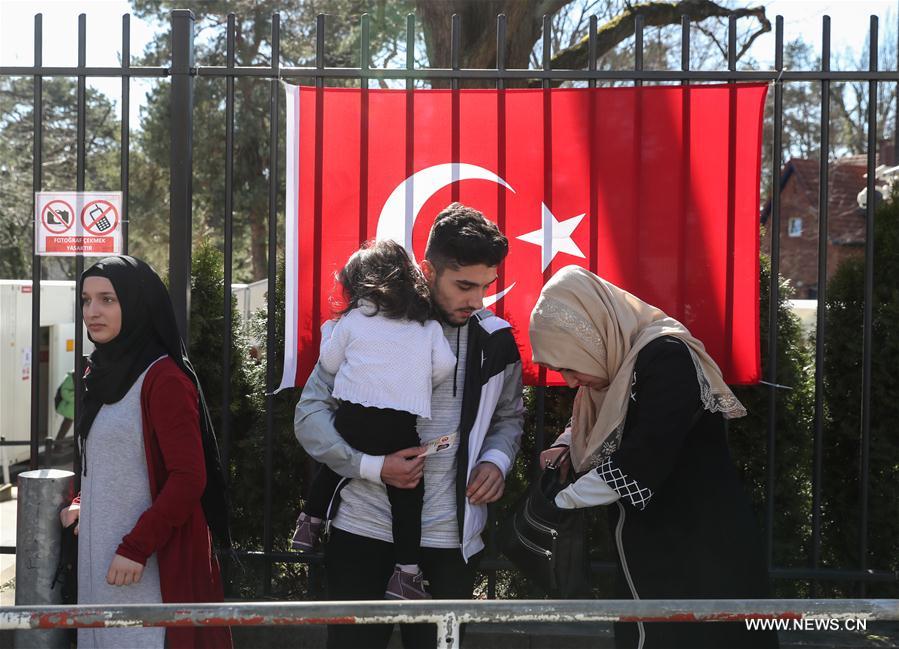The spying row with Berlin escalated this week after revelations over depth of Turkish intelligence agency’s espionage activities against opponents of President Recep Tayyip Erdogan, mostly sympathizers of Gulen movement, in Germany, prompting German prosecutors to launch an investigation into the matter.
German Interior Minister Thomas De Maiziere has said his government will not allow Turkey to conduct intelligence obtaining in Germany, as relations almost simmered to the boiling point recently.
“We have repeatedly told Turkey that something like this is unacceptable,” De Maiziere said. “No matter what position someone may have on the Gulen movement, here German jurisdiction applies, and citizens will not be spied on by foreign countries.”
“Espionage activities on German soil is punishable by law and will not be tolerated by us,” the minister said in a blunt warning against Turkey. “That applies to every foreign state and every intelligence agency.”
“It is clear that the Turkish secret intelligence service, MIT, is investigating people living in Germany,” Boris Pistorius, the interior minister of the northern German state of Lower Saxony. He lashed out at the Turkey’s intensity and recklessness to pursue Turks living abroad.
“It’s intolerable and unacceptable,” Agence France-Presse quoted Mr. Pistorius as saying at a press conference on Tuesday.
Turkey’s major spy service MIT handed a list of nearly 300 people affiliated with Gulen movement, including their phone numbers, photos, and addresses, to their German counterparts, seeking their help to continue surveillance on targets. The scope of details shuddered German officials, prompting German lawmakers to reject cooperation with the Turkish intelligence.
German newspaper Süddeutsche Zeitung and television channels NDR and WDR run a joint story, reporting that MIT Undersecretary Hakan Fidan gave a list of 300 people and 200 Gulen-linked organizations to German Foreign Intelligence Service BND Head Bruno Kahl at Munich Security Conference in February.
Then BND shared information with state governments and local police. German federal prosecutors announced that they have launched an investigation into the claims, working to find out how Turkish intelligence was able to gather such a detailed information on targets.
“Turkish authorities were acting with “something close to paranoia,” Mr. Pistorius said. “All Gulen supporters are assumed to be terrorists and enemies of the state even though there is not the tiniest scrap of evidence.”
“As of today, we have no evidence whatsoever that Gulen supporters have violated any rules in any way.”
Turkey’s global manhunt against sympathizers of U.S.-based cleric Fethullah Gulen has strained its relations with allies.
Ankara ascribed blame on Gulen movement for an abortive coup last summer. Mr. Gulen and his sympathizers reject any link to the coup. Turkey has designated the movement as a terrorist organization and has pressed its allies to recognize the group as such.
But neither Germany and the U.S. do that.
“Outside Turkey, I don’t think anyone believes that the Gulen movement was behind the attempted putsch,” said Hans-Georg Maassen, head of the German Federal Office for the Protection of Constitution, the domestic security agency.
“At any rate, I don’t know anyone outside Turkey who has been convinced by the Turkish government,” he added.
A week before, Mr. Kahl echoed similar views, telling Der Spiegel that Turkish authorities have failed to convince German intelligence that Gulen movement was behind the coup attempt.
The media reports of Turkey’s intensified spying activities on German soil triggered a political storm, galvanizing German lawmakers already detesting Turkey’s authoritarian leadership.
German Social Democrat Party (SPD) Federal Parliamentary Group Head Thomas Oppermann unleashed a torrent of criticism over the matter.
He urged the federal government to stop and prevent such spying activities against innocent people, deploring that MIT has no place in Germany.
German officials have called on the Turkish people who are on the watch list of the Turkish intelligence not to travel back to Turkey, stay away from Turkish diplomatic compounds, embassy or consulates across Germany.
Northern Rhine-Westphalia police also said MIT documented information about 140 people living in the state.
For Christian Democratic Union (CDU) Spokesman Armin Schuster, the problem over Turkey’s spying activities in Germany is much bigger and challenging than the row erupted over Turkish ministers’ political campaigning in German cities.
Speaking to German news agency DPA, Schuster described the latest chapter in relations as a serious diplomatic crisis. The list of Gulenists points to an unsettling fact that MIT carried out intense espionage in a NATO country, one of Turkey’s allies. To derail such efforts, he urgently recommended deportation of any Turkish intelligence member who took part in intelligence gathering activities.
Last month, German police raided apartments of four Turkish imams over charges of syping on behalf of the Turkish government. That elicited a sharp reaction from the Turkish authorities who retaliated with arrest of Turkish-German journalist Deniz Yucel, working for Die Welt, on the grounds that he was a terrorist and acting as an agent to promote Germany’s interests in Turkey.
That put Turkey and Germany on a political collision course. The state of acrimony and mutual recriminations further animated by Berlin’s refusal to allow Turkish ministers to campaign in German cities to lure 1.4 million Turkish voters in Germany for constitutional referendum seeking to vastly expand Mr. Erdogan’s already powerful presidential powers.
********
This article was possible thanks to your donations. Please keep supporting us here.


